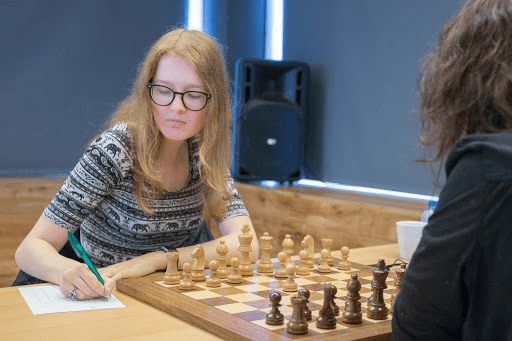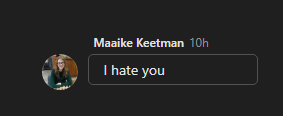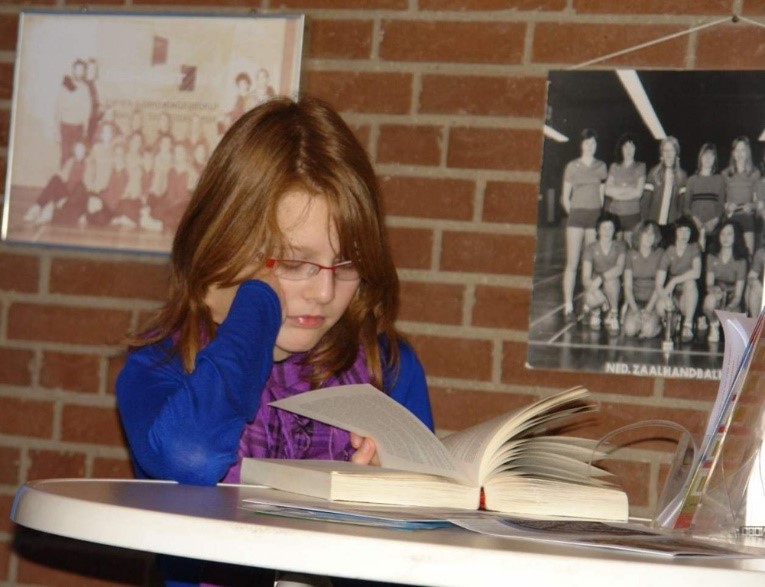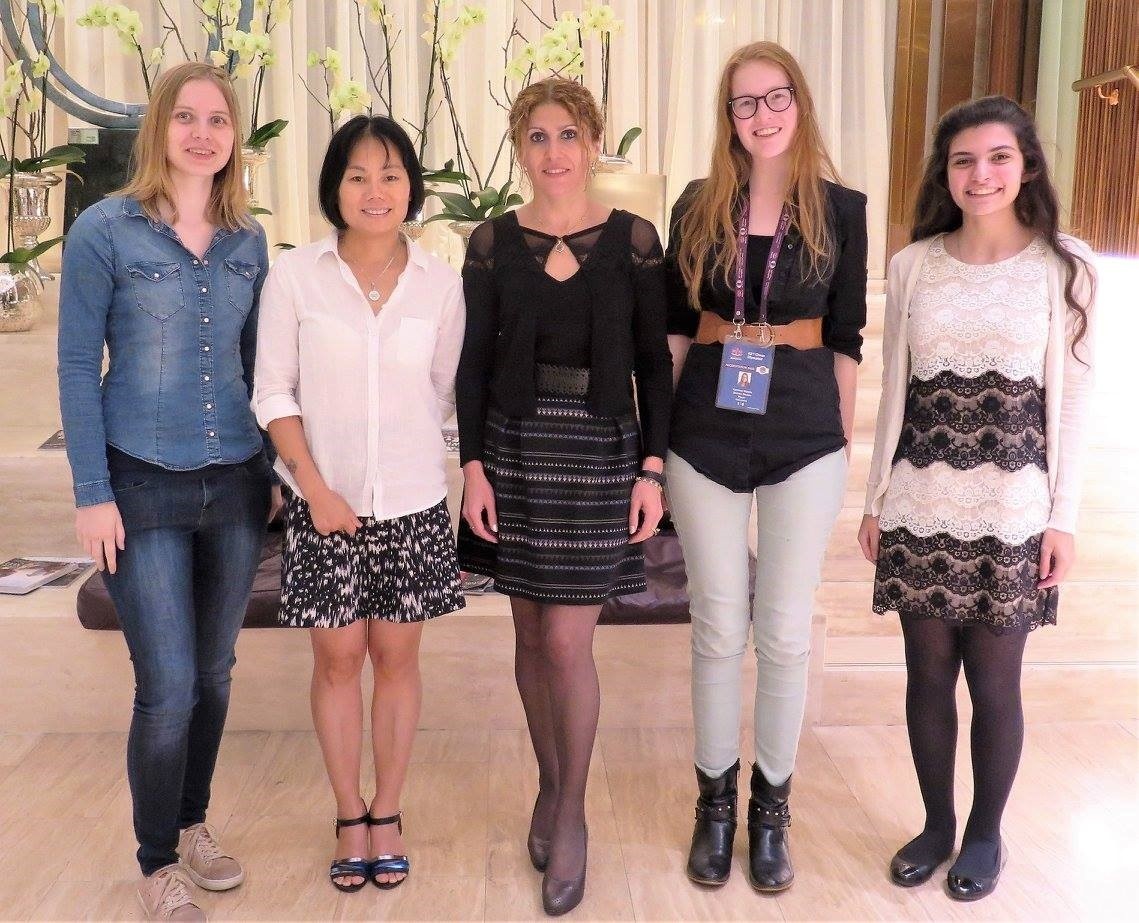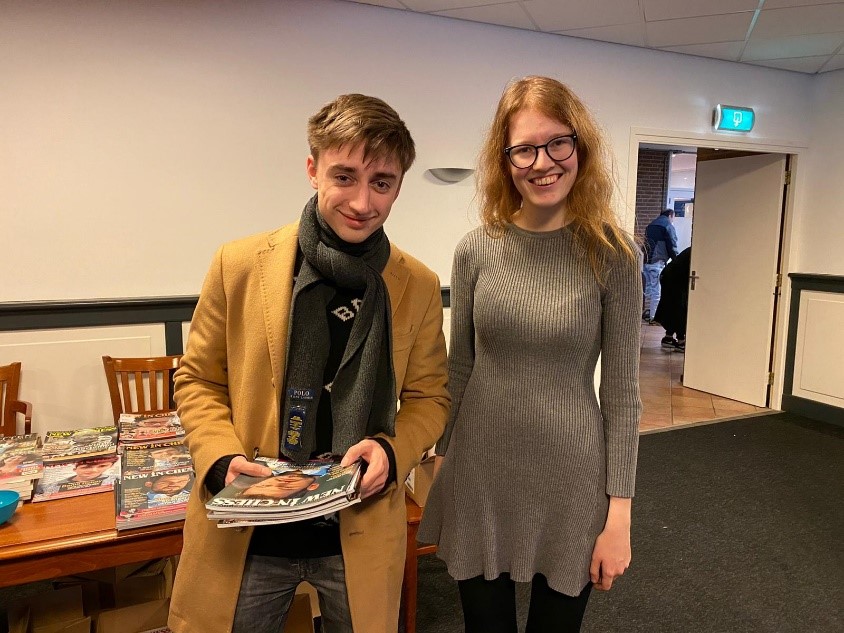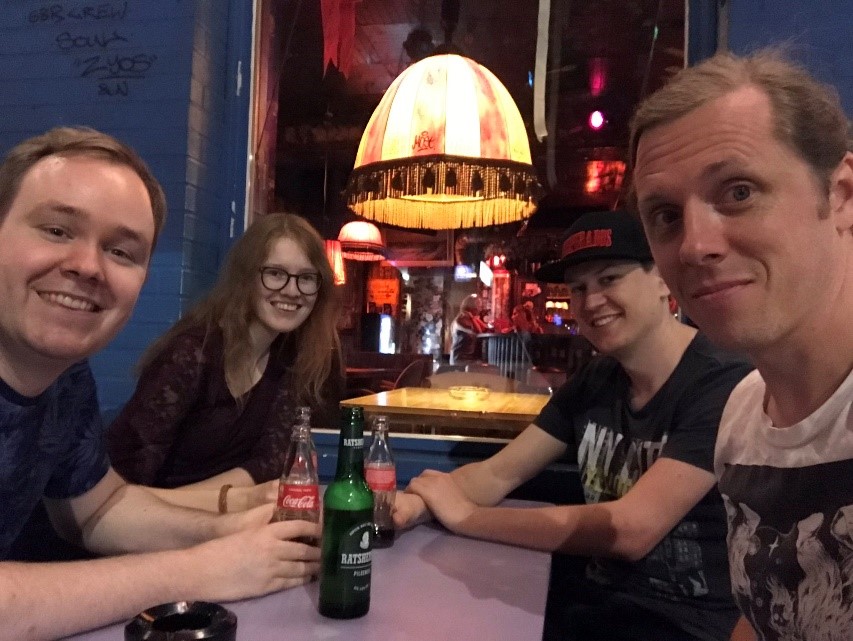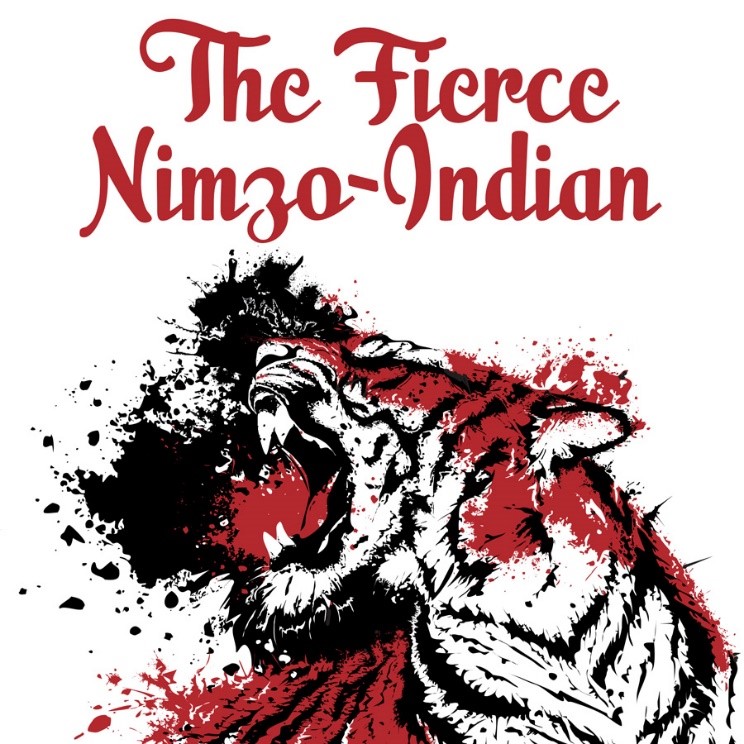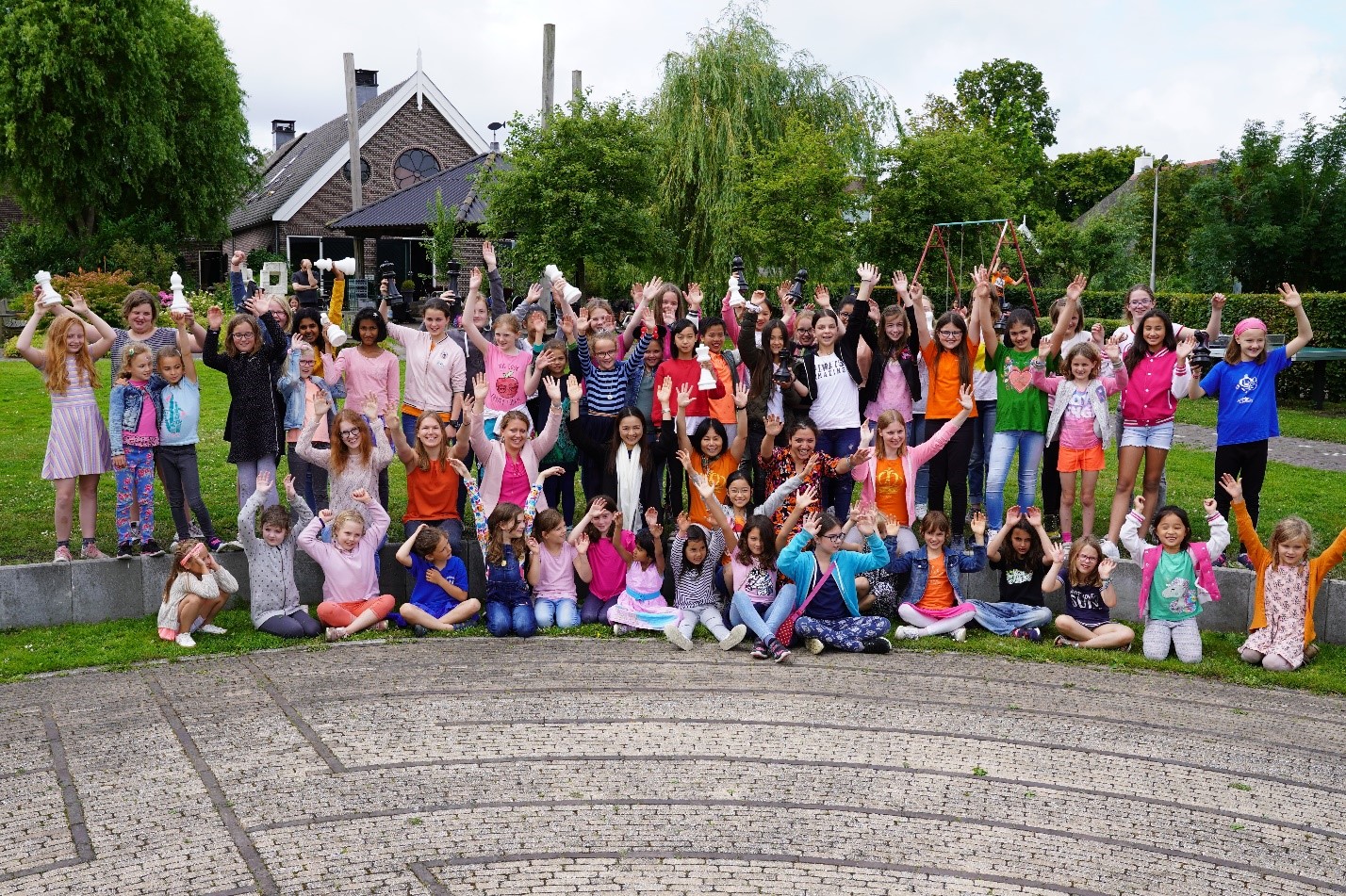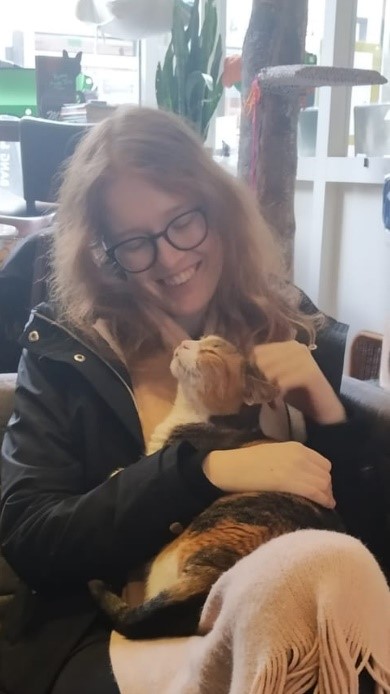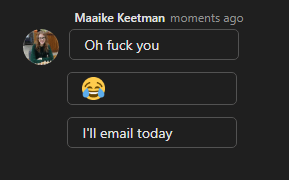Table of Contents
Introduction
WFM Maaike Keetman is a Dutch chess player who was a part of the Dutch Female National Team at the Baku Chess Olympiad in 2016. Outside of the Dutch chess circles, she is probably better known as Chessable’s employee as during her two-year reign in this company she supervised, edited and quality controlled hundreds of Chessable courses. In fact, due to her contributions and work-ethic, in late 2020 she became a Publishing Manager at that very company, at the age of 21.
On top of it all, Maaike also managed to apply all the knowledge about course creation she gained over the years and channel it into the creation of her very own course. In October 2020, the world saw her debut as a Chessable author as her highly successful (and verbose)1 Chessable course on the Nimzo Indian defense, titled The Fierce Nimzo-Indian, was released.
I first met Maaike soon after I joined Chessable. We started collaborating and working on the same projects and I was immediately impressed – not only with her thoroughness, precision and work ethic, but also with her patience, friendliness and sense of humour.
We immediately found the common language and developed a very good relationship based on mutual respect and appreciation.
In all sincerity, Maaike is one of the nicest and friendliest people I have encountered and I am happy she is not only my colleague, but also a friend – and am therefore really looking forward to this interview!
Maaike Keetman as a Chess Player
Q: Hi Maiike and welcome to Chessentials, it is really nice and exciting to have you here! First of all, since I am not well-versed in Dutch names, would you mind sharing how did you get your name? Does it have any deeper meaning?
A: Maiike doesn’t have a deeper meaning 🙂 however, Maaike is the Dutch/Frisian (an area in the Netherlands where they also have their own dialect) version of Maria.
Q: In the interview for Chessable Blog you have already talked about how you got involved in chess 2 and you mentioned you started playing chess after your brother started playing it. But I haven’t realized who actually taught you the rules? Was it your brother, your parents or were you some sort of self-learning prodigy? 😀
A: My parents did (mainly my father). We read many books together when I was young, as my English wasn’t good enough yet to understand it all, so he helped me read them.
Q: Was the fear of being unable to beat your parents also the reason you decided against learning checkers? Or were you born as a true chess elitist and always considered checkers as an inferior game?
A: I always was more fascinated by chess – somehow, the fact that there is only one (okay, perhaps two, when you „promote“ your piece) piece made it seem so boring compared to chess. I’ll admit that in my own country, checkers is reasonably popular (less than chess, but we have had many world champions) so it would definitely have been a logical choice for me – but chess was just much more inspiring for me.
Q: Okay, okay, you very soon joined a chess club? What happened next? When did you start playing tournaments? Did you have any trainers? When did you first realize you might be gifted for the game?
A: Yes, quite early! Soon I played my first tournament, the Noord-Holland (area in the Netherlands where I’m from) championship under 8 when I was 6. This was the qualifier for the national championship U8. As I was the only girl, I automatically qualified – but I ultimately skipped the tournament to perform in a ballet show… luckily, I soon realized I had zero talent for ballet, but that the chess was going much better! So the year after, I did play the national championship and made second place total (and girl’s champion).
(A photo of young Maaike with a Harry Potter book. Note: All photos were provided by Maaike from her personal archive.)
Q: In the Chessable interview, you also mentioned you studied the Step method, a special chess teaching method devised by Dutch authors that has been recently gaining some recognition? Would you mind sharing your experience with it? What are some of the advantages and disadvantages of using it with young players compared to other more conventional methods (books + analysis) or modern methods (Chessbase + engines)?
A: I personally really loved it! In Dutch chess clubs, almost every child learns from that method, I think. It is very methodical and therefore leaves little gaps in the knowledge of patterns – in the category of tactics especially. There is an instruction book for the teacher, and exercise books for the pupils: a basic one, but also 2 other ones with even more exercises. To make it more fun for the kids, usually, one „step“ book is covered in a year and there are exams at the end when you can get a sort of degree and a grade for how well you did.
I enjoyed solving exercises so much, that I would usually go through all of the books multiple times. I even made a game out of it with myself, that I would use a timer and try to solve a whole book as fast as I could! I truly believed this helped my pattern recognition a lot and I think that tactics is the area of chess where I’m strongest currently as well. These days, Chessable is perfect for such ways of training, but back then I of course had never heard of space repetition – I just tremendously enjoyed it!
As for conventional/modern: in the Netherlands, this is considered conventional 🙂 but at a later age/higher level, I think that learning from books and especially analyzing your own games and learning from your mistakes is very useful to improve.
Q: How successful were you as a player in your youth? How were you faring in your age group on the national level? Did you play a lot of international events (in terms of European Youth events, etc.)?
A: I was usually at the top of my age group, especially when I was young. I already mentioned the second place overall U8, and I had the same result the year later. From the age of 10, the championships are split in my country, with separate categories for boys and girls. In the U13 girl’s championship, I became the national champion. After that, I always played in the open category where I was usually the only girl. My best result there was a fourth-place U15.
I did have some international results as well: when I was 9, I played my first European Youth Championship and had an average performance. In total I played in 5 different European Youth Championships (2008, 2009, 2012, 2015, 2016) and usually played in the (sub)-top, often fighting for top 10 and getting shared 2nd in 2015 (see next question!). I also played in the World Youth Championship in 2015.
Q: You have mentioned one of your greatest successes is the shared 2nd place in the U16 category at the European Youth Championship 2015 in Poreč, though. Can you describe a bit how did your tournament go? What was your daily routine? What were you feeling like when you finally climbed the podium?
A: This is quite a crazy story actually! I had won the first 2 rounds, and then in the third round, all was going alright. However, at some point during the game, my chair broke!! The arm rests broke off, which hurt me a bit but was mainly very distracting (also I felt very embarrassed for breaking something, as this happens to me a lot…). I played very badly but somehow managed to draw an endgame an exchange down. The day after I also drew, but in round 5 I lost to the number 1 on rating, Stavroula Tsolakidou (now an IM). So it wasn’t going smoothly at all.
Luckily, I managed to score 2,5 out of 3 from the next games and was on 5,5 out of 8. In the last round, I faced the number 2 on rating who already had 6,5 points. It is worth noting that there was additional pressure here, since my roommate, Anna-Maja Kazarian, was in fact leading our group! 3
If I would win, she would win the title. After a tense game, I managed to win, Anna-Maja became champion and I got shared second – naturally, a very happy moment for me and the whole Dutch delegation :)! 4 The following (embarrassing) picture shows how happy I was…
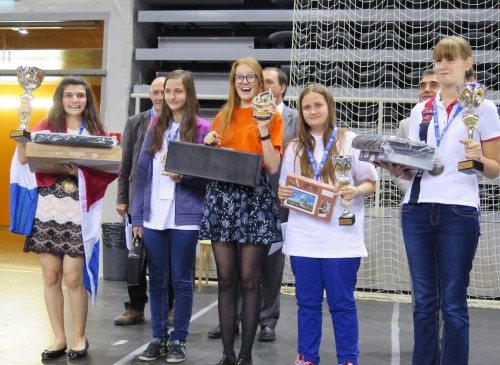 (A photo from the final ceremony of the tournament. Anna-Maja Kazarian is to the far left)
(A photo from the final ceremony of the tournament. Anna-Maja Kazarian is to the far left)
As for the routine, I was coached by the strongest Dutch female player, GM Zhaoqin Peng who helped me prepare every day and also trained with me and the rest of our small group (usually at those international championships, coaches have 4 of the Dutch players and will have training/prep sessions with them) which was very valuable for me. I also really love the social aspects of those international tournaments, so I definitely wasn’t just focused on the chess, and really enjoyed being a tourist and swimming a lot, as well as playing games with the other Dutchies.
Q: As a side note – quick impression of Croatia and Croats? Can we boast our country and people contributed to your good result?
A: Well, the great hotel definitely helped! The food was truly amazing and put me in a very good mood. I remember it was around 20 mins walking to the playing hall from our hotel, which was perfect: the Croatian weather is lovely! The scenery from the bus also seemed amazing, so definitely a good impression of the country.
However, my trophy had the word „chess“ misspelled, so perhaps the Croatian people didn’t make a perfect impression on me…
Q: A year later, you also became a member of the Dutch National Female Team at Baku Olympiad 2016. How did you qualify and get this opportunity? Who were the other team members?
A: I was quite lucky to get this opportunity. I did not qualify or anything, but my rating was rising and I believe they wanted to have a mix of experienced and young and upcoming players, so I was selected as the reserve board! I was really really excited, of course. The other members were the very strong players GM Zhaoqin Peng, WGM Anne Haast and IM Tea Lanchava, who have all won the national championship at some point, as well as the already mentioned Anna-Maja Kazarian.
Q: What was it like to play in the Olympiad and represent your country? Were you impressed or inspired? How are you satisfied with your result?
A: Highly inspired, yes! It was a very unique atmosphere. Thanks to our very strong men’s team with Anish Giri, we were in the hotel with all of the top countries and it was highly interesting to see all of those players in a casual atmosphere. Usually, you just see them behind the board, all suited up, but now people were wearing sport’s clothes, just casually chatting with their team members (or one particular country stood out to me for the fact that their members would all sit at separate tables and not talk at all).
It was really cool to be part of that! About my result we can be very short: it was disappointing. But if I ever get the chance to be on the team again, I’m highly motivated to do better!
Q: It is also well-known that Olympiad is rich in off-the-board events (who doesn’t know of the (in)famous Bermuda party). Do you have any memorable (or not so memorable, if you catch my drift) stories to tell? What was your impression of the top players and Grandmasters when you got to see them in a less formal environment?
A: I have plenty, but as may expect, many are not suitable to be put here on the internet 🙂 I did have one funny conversation at the prize ceremony, where I was sitting close to Baadur Jobava, and he asked me „I can’t even remember who won last year, do you?“ and in fact, no one around us seems to know! I guess that’s how it goes when there are so many tournaments…
I also remember that the Chinese women would celebrate a win by eating KFC, a ritual I very much support!
(Maaike as a part of the Dutch Olympiad team 2016. From left to right: WGM Anne Haast, GM Peng Zhaoqin, IM Tea Lanchava, Maaike and WIM Anna-Maja Kazarian)
Q: A look at your rating graph reveals it was precisely in 2016 that you achieved your peak rating of 2254 (December 2016).
Even though there is a lot of variation subsequently (presumably caused by K40 rating?) and even though you did reach a very similar rating a year later, it is very chessplayery to try to conclude anything on the basis of rating, so let me try – would you say you played your best chess in that period? That you were at the peak of your form?
A: I think that in general, I played much worse than I do these days. Especially my opening play has improved a lot since, as that was quite a weak point of me back then.
Q: Alas, starting from late 2017, a certain drop in rating, followed by a period of stagnation in upper 2100 spheres, which lasts to this day, is apparent. Would you mind sharing your perspective on this?
Is there a certain correlation between the work you put in the game and your playing strength and that god damn number? Or is it a pure coincidence that doesn’t reflect the true state of affairs?
A: I don’t think this is a coincidence at all. As I just mentioned, I think I play better these days, but there is a very logical explanation: between October 2016 and September 2017, I took a gap year where I worked 3 days a week at New in Chess (more on that later) and would devote a lot of time to chess on other days.
Being in this mindset obviously helps a lot when you play a tournament, and I would often perform well. I also played on a very regular basis. In September 2017 I went back to University to pursue a degree in Econometrics, which is considered a very challenging subject. That meant that I could devote a lot less time on chess, and whenever I did have a tournament, my results would often be mixed as I sometimes felt too tired to play.
That said, when I did feel energized, I manage to achieve some good results – for example, I did not score any norms in 2016 or 2017 (although I was often very close), but in 2018 I made my first WIM norm in Barcelona and in 2019 I managed to win the WIM Arisan Chess Ladies tournament, scoring my second norm. In both cases, I scored a half-point extra than needed!
So when I’m on form, I do believe I can play better than I did in the past. Sadly, when I lack focus, I will have some bad losses and drop a lot of rating – for example in the Dutch league, which is just on a Saturday and you don’t know your opponent beforehand. That lack of preparation and not the full tournament mindset often costs me rating points, as I have suffered quite some losses there in recent years.
Q: What is the current state of your game? You did mention in the Chessable interview you don’t work as much on chess, but that you still train daily. How many hours do you devote to chess training? What do you do?
A: Because of Covid, I haven’t played since March and I find it hard to say how strong I would currently play, as I definitely lack some rhythm now! That said, I love chess and try to train as much as I can besides my job and studies and usually study something every day. This can be many different things: openings, strategy, tactics, you name it.
Q: I know that you have a very ambitious long-term goal of becoming an International Master (and a short-term goal of becoming a Woman International Master). Is becoming an IM more like a future idea, or an actual dream/goal you are definitely going to try to commit to once the Covid crisis is over and things get back to normal?
I am asking because I also have a goal of becoming a FM, but I am not sure if I am ready to really commit to it (spend time and money, experience the agony of defeats and potential setbacks, etc). Since recently more and more people are declaring ambitious chess 5 goals, I am curious to hear your thoughts on this topic?
Do you think there are any inherent dangers of setting ambitious long-term goals or do you consider it helpful to maintain focus and direction? 6
A: I have always dreamed of becoming an IM, ever since I was little (never GM, actually). I definitely want to commit to achieving this, but indeed, where to find the time? My motivation dropped a bit with the whole Covid situation as there are no OTB tournaments, but when that is over and I have graduated, I expect to have a lot more energy again and am really excited to see how far I can come!
I am ambitious in many ways, and the thought of setbacks doesn’t really scare me. However, you of course do have a point that there can be some dangers to having (too) ambitious plans – if things don’t work out in the short term, it can be very disappointing.
There is also the small issue that when you have achieved your goal, there suddenly is this „emptiness“ and you don’t know what to do anymore. I think this is quite often seen, and that people who get FM/IM/GM drop some points soon after, as the motivation has dropped.
That said, I do think it can be very motivating to have a certain goal and work towards it in small steps, as long as it’s realistic. This is of course very cliché, but I think it’s important to not only think about the goal but also the journey, and just enjoy that as much as possible. Then it should be fine!
Maaike Keetman as a Chessable Manager
Q: Okay, I think I have poked enough about your chess career. Let’s switch the topic and talk about your Chessable career. You mentioned in the Chessable interview you had been working for New In Chess before you switched to Chessable. The million-dollar question is – how did you start working for New in Chess?
A: As is often the case, I was lucky and had some connections! My trainer at the time, Wim Andriessen, was actually the founder of New in Chess! So I managed to get some small chores there from a very early age, I believe I was 13 or 14.
Usually, during the summers, I would do some work, or just throughout the year as my high school was about 5 minutes biking from their office. I would often go once a week after school to do some work. In October 2016, I started working there on a more regular basis, working 3 days a week there for 9 months.
When I went back to university, it became less regular again, but I kept working some occasional hours.
(Maaike in good company – with GM Daniil Dubov at Tata Steel 2020)
Q: When you say you „switched“ to fully work for Chessable, what exactly does it mean? Could you elaborate a bit on how did this transition exactly happen?
A: In the summer of 2018, I was working at NIC again for the full summer. One day, we had a visitor – David Kramaley, the CEO of Chessable! He showed me the site and there was an agreement that I would start importing New in Chess books to the Chessable platform.
This meant that essentially, I was doing work for both companies. I was very fascinated by Chessable and saw great potential there (keep in mind, the site was nowhere as big then as it is now!) and in February 2019, I decided to only work for Chessable and I’m still very happy about that, as I love it here!
Q: If I am not mistaken, some of your family members have worked for NIC back then (and they still do)? How did they react when it transpired you will be switching companies?
A: Yes, in fact, my mother, sister and brother all work there until this very day! Although admittedly, my brother only started working there more after I had left. We just talk about work as little as possible, and that is fine by me.
Q: Okay, after you joined Chessable, what exactly was your job description? Would you mind explaining to readers what Chessable exactly is and what were you doing? What does it mean to „import a book“?
A: I have always been part of the content team. In fact, I was one of the first members of that department – these days, we have a lot of staff members who focus on creating and improving our content, but back then it was much smaller.
Any Chessable course doesn’t appear out of anywhere, but a staff member (or author) has created it based on the available (pgn) files. This is often a lengthy process, editing and formatting the course so it is suitable for the platform and it’s famous MoveTrainer technology that helps you study and train all exercises/variations.
One important thing is that before publication, a course always gets „beta tested“. This means that actual users will try out the course and give feedback on it, which the staff member would then incorporate.
This communicating with people and making a product better together was something that I always really enjoyed, as it ensures that work is never boring or repetitive!
Q: How have your responsibilities and role in the company changed in the prior two years before you got your current position? Could you summarize in one paragraph your journey from being an importer to becoming a Publishing Manager?
A: I was an importer for quite a long time: if you count my time as an importer for NIC courses as well, I did it for almost 2 years. This was because the company was less big, so there was less organizational structure necessary, and because I was only a freelancer. In the last week of April, I pitched the idea of making my own Chessable course (more on that later!) and coincidentally (or not…?), 3 days later, I was asked if I wanted to join Chessable full time.
I said yes, and because I had a lot of experience (keep in mind that most people only joined the team in 2020, including this blog’s owner) I was made co-head of the Content Quality Assurance. This was a lot of fun, and I had a lot more communication with authors which I really enjoyed. To improve the standards of the content, the Quality staff members will give authors feedback on their files, and also give the importers feedback on the final course on Chessable.
This is getting longer than one paragraph 🙂 but at the end of August, Chessable had grown a lot more, and I was asked if I wanted to be Publishing Manager to help manage the content team! I did not need to think about it for long, and of course, said yes, and have been enjoying it for 3 months now.
(Maaike with the Dutch Chessable gang, back in the day when hanging out without a mask was still a thing…)
Q: What exactly does a Publishing Manager do? How different is the job in your current role in contrast to what you did in the past?
A: There is a variety of things, but one of the key things is that we manage the publishing schedule. This means that we are in charge of communicating with authors and planning their courses, making sure everything is published on time.
It also means that we manage the importers and Quality staff members, as they are creating the content. Besides that, there is a variety of other things, such as communicating with new potential authors, creating contracts for them, but also planning sales and many other things.
A key difference is that I have to talk a lot with a lot of different people and thus have a lot of meetings, whereas in the past there was a lot of manual, actual importing work. But as you can probably tell from this (very!) lengthy interview, I don’t mind talking at all!
Q: How does it sound to be a „Manager at 21“? Were you surprised when you were provided with the opportunity? Do you ever look back and feel proud about everything you have achieved in your professional life (and not only professional life) in such a short span?
A: Haha, I usually don’t say that out loud, it sounds so weird! I have to admit that I was surprised, yes. I was very happy as the co-head of Quality Assurance and as I was only doing that for a few months, I didn’t expect to get promoted so soon. But I’m very happy to have gotten the opportunity!
I usually prefer to look forward 🙂 and am excited about the future!
Q: Last but not least – allow me to put you on the spot right now, but you know I can’t resist 😀. Gun to your head, what would you say is the best thing and what would you say is the worst thing when it comes to working for Chessable?
A: Well, I truly love chess, so being able to work in that world is amazing! And I love everything about the company. I guess that forces me to say that the best thing is the amazing coworkers 😉
As I like it all, the worst thing is probably something that can be both good and bad, and is probably relatable for a lot of people in this Covid-era: the working from home and not seeing your colleagues in person.
I personally enjoy the flexibility that working from home gives you, but it can be a bit tricky too: there is a less clear distinction between working hours and free time, so it can be very tempting to keep working until very late (just answering an email here, a message there, and suddenly, it is very late).
(Well, I guess there are easier ways to achieve work-life balance… :D)
Maaike Keetman as a Chessable Author
Q: Apart from being a Chessable employee, you recently also joined the ranks of Chessable authors, as your first Chessable opening course, titled „The Fierce Nimzo-Indian“ was published.
Why did you choose to do a course precisely on Nimzo-Indian and not, say, the French Defence, which is also an opening you have been playing in your youth and in which you have great expertise?
A: Well, I pitched several ideas I had. I really wanted to do something on the French Defense, but then we had just signed Anish Giri up to make a repertoire on that opening (which is really excellent by the way)! So, that didn’t seem to be a very good choice anymore. However, I always struggled when facing 1.d4 and thought others may have the same issue, and I had been very happy with my Nimzo-Indian analysis there, so I pitched that idea and it was approved!
I’ll add that it was always my dream to write a chess book (keep in mind that I worked for a publisher for a very long time, so a book was the ultimate goal). However, a Chessable course seemed just as cool, so I was really excited AND nervous to pitch that! I postponed it for a very long time, but ultimately am really happy that I took the leap.
(Artwork for Maaike’s course. Let the Tiger roar!)
Q: In the Chessable interview you mentioned it took you 5 months to create that repertoire, which already speaks volumes about the difficulty of creating a Chessable course (or any chess book, for that matter). Could you talk about the specifics in greater detail? What was the process like? Which steps does it consist of? What caused you the most difficulties?
A: Yes! I just pitched it as „b6 Nimzo“ but after lots of analyzing, ultimately used none of my old analysis and made it all new from scratch. I think it could have been done a lot faster, but I had 2 very specific things in mind for this repertoire which made it a lot more challenging.
First of all, I wanted it to be very dynamic. It is much easier to just follow your engine and try to find positions where Black can draw. But I was very keen on creating unbalanced positions, not aiming for a draw but where Black can really fight and try to win!
This of course does not mean that Black will be better from the opening, but just that there are more chances for both sides to get a real game. This meant I often had to redo analysis if the positions were too boring or if White had too many options to force a draw, so it took quite long to find lines that suited my purpose. Ultimately I succeeded quite well with it I think, or at least users have told me that they get very fun games with the lines, so that makes me really happy!
Second of all, I find it really important to truly understand why something is played. As I have seen so many different courses, there is one thing that comes up almost every time: users who want more explanations and want to understand what to do after the opening moves have ended. So, that’s what I gave them!
I believe it ultimately boiled down to over 180K words which is very, very big. As this number did not immediately mean something to me, I googled that the first Harry Potter book has a little over 75K words. So my course is almost 2,5 times the first Harry Potter book! That truly shocked me, and you can imagine it takes a while to write that much.
Q: You also went on to record the video. Even though you haven’t had a lot of experience in front of the camera, you seemed very natural. Were you nervous at all before you started filming? How did you manage to maintain your composure and be so relaxed?
A: Soooo nervous!! In school, I was always terrified when I had to do a presentation, so I was very worried it would be really awkward and everyone would hate it, but I thought it would be good for me to try and see how it goes. And in fact, after the first day where all technical details were taken care of and I got a bit used to the process, it went quite smoothly.
It probably helped a lot that I was at the professional studio, as I only had to focus on the recording itself, and not on how to set up the equipment and such. Whenever I started a chapter, I would just get really excited and happy to talk about the lines that I spend so much time on! So all the nerves would just fade away as soon as I started talking.
I learned a lot too so hopefully next course, it will go even better!
Q: Do you have any ideas/plans for subsequent repertoires? Since Fierce Nimzo-Indian only covers 1. d4 Nf6 2. c4 e6 3. Nc3 move order, are there any plans to complement it with another repertoire against other White 1.d4 „shenanigans“? There are rumors your knowledge of Jobaava London might need some refreshment.
A: Definitely! In fact, I have already started working on it, so stay tuned 🙂
Q: If you got to give advice to all potential Chessable authors (and/or some existing ones), what would it be?
A: For potential authors: to not be afraid of the whole process. It may seem long and perhaps scary, but I enjoyed working on the material so much and it was so amazing when it got published! So I can definitely recommend making a course.
As for the actual creation: as a publishing manager, I often give advice to authors on how to improve the content, and I think one key thing is to keep the target audience in mind. The average user will not be a top player, so it is important to include lines they will encounter often and explain things that may be obvious to you but can be very valuable for the users. So the key advice is: don’t make it too difficult!
Maaike Keetman As Female (Chess) Ambassador
Q: There is one more chess-related topic I would like to talk about and then expand on it – your role with the Chess Queens organization. Would you mind explaining how was this organization founded and what is your role there?
A: This is a Dutch foundation, that was founded almost 6 years ago by the top players of the country; the 5 founders all played in the national team at the time. I will admit that I was not involved from the beginning (as I was only 15), but 1,5 years after that, somewhere in 2016, I was invited to be a part of it as a „chess princess“, so basically a slightly younger version of it 🙂
The aim of the foundation is twofold: to improve the level at the top, and promoting chess for women on a broader level. These days, the second goal is the most important and we are mainly targeting young girls.
In January 2019, the foundation expanded and now we have 7 members (all called chess queens). Currently, I’m the treasurer.
Q: The main focus of the organization is inspiring young girls to play chess. How exactly do you go about achieving this goal?
A: One thing we do is organize tournaments for the girls (see picture). Covid had made things more difficult, but we are organizing online tournaments for girls now and we have for example a grand prix series, currently on its third season already. Those include a tournament on Sunday morning for girls under 13, and one in the afternoon that is open to all women but mainly focused for girls under 18.
Several members of the foundation are also very active in giving training to young girls.
(Maaike: This is a picture from our OTB girls tournament in 2019, which was a big success!)
Q: Is there anything that could be done on a much broader scale (chess clubs, chess federations, FIDE, regular politicans and governments) that could entice more girls to play chess? If yes, do you have any ideas about what?
A: I think that with the Netflix series, the Queen’s Gambit, there is a lot of attention for women in chess right now. If FIDE or other federations/organizations can capture that and turn it into something real, I think we can definitely get more women to play chess. However, doing so is definitely very challenging.
Q: How welcome did you feel in chess playing halls throughout your career. How often did you have negative experiences connected to the hidden or not-so-hidden forms of sexism? How many times did you experience situations which made you extremely uncomfortable? Are „creeps“ exceptions to the rule, or rather the rule itself, in your experience?
A: I did always feel welcome; no one ever told me I was not allowed to participate somewhere. However, sexism is of course very present. At a young age, people would often not take me very seriously. Now at an older age, that is different, but still, when men lose to a female player, they tend to make more excuses for why they lost, instead of just admitting that someone played well.
There are definitely „creeps“ and it’s almost customary to encounter one or more at every tournament, but that means that the rest of the people are nice so I wouldn’t call it a rule. But it is definitely something that happens regularly and it can definitely discourage women from playing.
Q: What can an average, normal chess player do to make chess playing tournament halls more welcoming toward females and to make one „small step“ toward achieving the desired changes? 7
A: I guess that last comment just says it all 🙂 I think just treating women, in the same way, would help; so just take the game equally seriously and no derogatory comments or excuses. But I don’t think such a culture can easily change.
Q: Considering everything you achieved in the chess world and in a professional sense, you are a great role model for many young girls (even though – knowing you – you probably haven’t thought of yourself this way). What would your message be to any girl thinking about entering the chess world or fulfilling her dreams in a professional (or any other) sense?
A: Don’t let anyone stop you! If you’re passionate about something and you have the possibility, pursue it! If you have passion, you can achieve anything 🙂
Maaike Keetman off-the-board
Q: Okay Maiike, I think we have talked quite a lot about chess and plugged Chessable so far :D. Let’s conclude this interview with something not strictly chess-related.
First, the most important question of them all: Ketchup or Mayo?
A:. Ketchup, of course! Mayo is one of the most disgusting things on the planet! 8
Apart from doing everything mentioned above, you are also currently in the process of getting your degree. What are you studying and how is it going?
A: I mentioned Econometrics before, but that proved too challenging for me (given that I liked to also work and play chess), so I switched to Economics and Business Economics, where I’m focusing on the latter one and majoring in Finance. I really love numbers, so that’s a good fit for me! I hope to graduate and receive my bachelor’s degree in the Summer of 2021, although I’ll admit that studying in the Covid era is a bit different.
Q: Listening to you, one can’t help wonder how you manage to be so active on so many fronts? What is your secret when it comes to handling all these obligations?
A: I truly enjoy the things I do! If you enjoy something, it seems to cost way less energy.
Q: What do you like to do in your free time? What are some of your hobbies outside of chess?
A: Eating ice cream, cooking/baking, reading, Netflixing, taking walks, playing board games, (online) shopping, cuddling cats and just talking to friends! Oh, and I have been trying to learn Russian in my free time, although I put that on hold for now.
Q: Do you do also do any physical training? Any sport?
A: I no longer practice any sports (I briefly practiced judo at some point) but I love walking, running and just general fitness exercises. I think it is very important to be physically fit as chess games are much more exhausting than people think! Being able to concentrate for hours definitely requires a good fitness level.
Q: Are you interested in sport in general? Do you watch/follow any sports? 9
A: Not at all, surprisingly. I think many chess players are, but I never watch any sports. Perhaps that is why I have so much time for other things 🙂
Q: I do recall you mentioning Netflix quite often in the past, though. Do you have any good TV shows you watched recently? Or any old favorites to recommend?
A: So many! I mainly watch detectives or thrillers, although comedy is of course always good if you are tired and just want something easy. There are so many good ones, I always loved watching Dexter, I recently watched the first season of Bron (Danish detective, The Bridge in English) which was really good and these days I’m watching Lucifer again.
Q: What about books? Made any progress on that Mythos Trilogy? Any other good books you read recently you would like to recommend?
A: I have started on Troy, have to catch up with you of course! 🙂 I have always loved to read, in the past I mostly did fiction but now almost exclusively non-fiction (although hard to say which category Mythos is…). I love reading about things such as history, mathematics, economics, science and psychology. Some of my favorite books are :
- Freakonomics by Levitt and Dubner,
- How Not to be Wrong by Jordan Ellenberg,
- and I also really enjoyed the book The Unexpected Truth About Animals by Lucy Cooke
Q: If you could invite three persons to dinner, whom would you invite and why?
A: Maxime Vachier-Lagrave. And maybe just Vjeko and our other publishing manager Juan Almaguer, as we always have a lot of fun together! 😀 10
Q: Do you have a life motto? If yes, which is it?
A: Not really, although in Dutch I like to say, „rustig aan, komt goed“ which is something like, relax take it easy. Given how much there is to do often, it is usually helpful to take a deep breath and just be calm!
Q: Finally – allow me to conclude the interview with the most important question of them all – on a scale from 1 to Vjekoslav Nemec, how chessplayery would you say you are? What is the most chessplayery trait you have? 11
A: This is probably your hardest question! I probably have to be honest and say that I am closer to Vjekoslav level than 1, but I still like to think I rate lower than you…
I have a tendency to make things more complex than necessary, which is very chessplayery. But there are countless typical traits, I’m afraid.
Q: Okay Maaike! I would like to thank you for taking the time and demonstrating the true extent of your „verbosity“ by completing this marathon interview! I wish you all the best on all fronts and I wish you to fulfill your goals in the future – I am holding my fingers crossed that those chess titles start falling like ripe apples soon.
Looking forward to releasing this interview and collaborating a lot more in the future!
Now, if you could stop fooling around and actually do some meaningful work, it would be appreciated.
Those emails ain’t going to send themselves!
- Surpassing in word-count even that famous course on the Modern Defence.
- And a lot of other things I wanted to ask but now I can’t in order not to repeat things. Thanks, Sean!
- Some of the readers might be familiar with Anna-Maja Kazarian as she streams chess quite regularly on Twitch and is a Twitch partner .
- Maaike’s result can be found here, while the overall tournament results in the U16 girl category here.
- And not only chess
- Vjeko’s note: This is a very interesting topic I have been contemplating a lot recently, so it is very interesting to hear another perspective. Don’t be surprised if an entire article discussing it appears in the near future.
- Aside from not being a dick, but I am afraid that doesn’t really count and that it should be self-understandable.
- Unless you are a boomer, I guess :D. Btw, hi Geert!
- Note: On this blog we don’t really count chess as one
- Geert, she is lying, we are only working and never having fun, I swear!
- Hi again, Geert :D!

